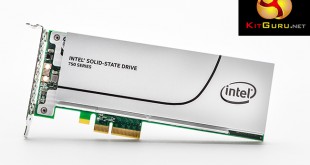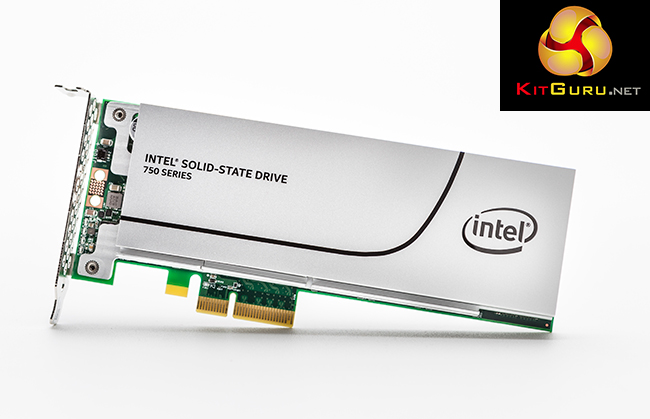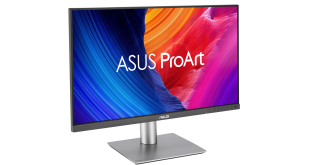
The push for greater performance from storage devices is seeing enthusiast drives transition towards PCIe-linked connections for increased bandwidth. While faster hardware is great, on paper, it is of limited use if the surrounding ecosystem is unable to put the performance increases to effective use.
That's where the SSD-optimised Non-Volatile Memory Express (NVMe) specification comes into the picture. Today we will be looking at one of the first storage devices to make NVMe accessible for enthusiast consumers – Intel's SSD 750 Series PCIe drive.
In the SSD 750 Series drive, Intel is aiming to give enthusiast consumers an SSD that is built for raw performance. There's no compromising when it comes to form factor, size, or power consumption – drive performance is the ultimate objective, with special emphasis on random operations. The big benefit that NVMe brings to the 750 Series SSD is lower latency, thanks to a combination of CPU-attached PCIe lanes and the specification's different CPU overhead.
Shipping in capacities of 400GB ($389) and 1.2TB ($1029), Intel is using a standard PCIe 3.0 x4 connector to feed the half-height, half-length (HHHL) add-in card version, while the 2.5″ (15mm-thick) alternative receives its four PCIe 3.0 lanes via the SFF-8639 connector. We actually saw an implication of more widespread consumer support for the SFF-8639 connector when we reviewed Asus' NVMe-supporting TUF Sabertooth X99 motherboard.
With head-turning performance numbers being thrown around, such as 2,400/1,200 MBps sequential read/write and 440,000/290,000 4K random read/write IOPS, let's take a closer look at Intel's SSD 750 Series drive and head on into testing.
Specification:
- Capacities: 400GB, 1.2TB.
- Interface: PCIe 3.0 x4 (NVMe).
- Form Factors: 2.5-inch with SFF-8639 connector, HHHL PCIe x4 Add-In Card (AIC).
- Memory Components: Intel 20nm MLC NAND.
- Sequential Read/Write Speeds (up to): 2,200/900 MBps (400GB), 2,400/1,200 MBps (1.2TB).
- 4K Random Read/Write (up to): 430,000/230,000 IOPS (400GB), 440,000/290,000 IOPS (1.2TB).
- Latency Read/Write (typical): 20/20 μs (400GB), 120/30 μs (1.2TB).
- MTBF: 1.2 million hours.
- Endurance Rating: 70GB Writes Per Day, Up To 219TBW (Terabytes Written).
- Warranty: 5 Years
- Power Consumption (Idle): 4W (400GB), 4W (1.2TB).
- Power Consumption (Active) Read/Write: 9/12 W (400GB), 10/25 W (1.2TB).
- Weight (up to): 195g (AIC), 125g (2.5″).
- Operating Temperature: 0-55°C (AIC), 0-70°C (2.5″).
 KitGuru KitGuru.net – Tech News | Hardware News | Hardware Reviews | IOS | Mobile | Gaming | Graphics Cards
KitGuru KitGuru.net – Tech News | Hardware News | Hardware Reviews | IOS | Mobile | Gaming | Graphics Cards




Looks great! As per with all the new stuff… Not keen on the price! Ha But absolutely do want!
Looks great! As per with all the new stuff… Not keen on the price! Ha But absolutely do want!
♋♪♪♪♪♋86$ PER HOUℛ@ai5:
Going Here you
Can Find Out,,
►►►► ::>>http://WorkOnlineMag.com/get/position…
✸✸✸✸✸✸✸✸✸✸✸✸✸✸✸✸✸✸✸✸✸✸✸✸✸✸✸✸✸✸✸
Hi Norbs,
There are some enthusiasts who stand by backplates on any expansion card they use. When dropping more than £300 or £800 on an SSD, a black backplate worth tens of pennies is not too much to ask for.
A metal backplate would also conduct heat away from the rear-mounted NAND packages, so its function is more than to prevent ‘severe clashing with one’s system’.
Luke
I just would refrain from listing it as a CON of the card; it’s performance speaks for itself. Most datacenter grade pcie cards don’t have any type of backplates. Only reason I’d agree with you would be to simply protect the NAND because
I’m pretty sure intel did their due diligence to make sure that card
does not need cooling on those NAND chips.
I think it’s fair to call it a con; many enthusiasts will want a backplate but the drive doesn’t have one. To many people, buying a piece of computer hardware is about more than just the performance (whether or not other people agree with that mindset). As we can see though, it is a clearly a minor ‘con’, hence why it’s tied in with the point for an intermediate capacity. I would be surprised if anybody chose not to buy it solely for lacking a backplate, but they may attempt a mod to make it look better in their system.
I agree that the NAND packages on the rear are unlikely to *need* cooling from a backplate – they are relatively low capacity (lower number of dies). Most people value a backplate for aesthetics although there are arguments for structural rigidity and cooling, whether or not they are actually required by the drive.
I just pointed out the lack of backplate as a con. If you personally don’t see it as a con then that’s completely fine and it can be ignored.
Luke
Why get this when you can get the Samsung SM951. Sure the SM951 is AHCI not NVMe, but 2.0 GB/s is insane regardless. On top of that, I believe it’s less expensive, and it’s nice and small due to it being M.2, therefore leaving room for your 2 or 3 GPUs, soundcard, or whatever. Plus, I’m sure Samsung will make a more consumer-ish / less OEM-ish version of the SM951 soon which I’m guessing will be NVMe, but now I’m just speculating. Anyways, Samsung SM951 all the way.
The intel kills the SM951 on iops… depends on what you are using it for and too was trying to decide which to buy. On one hand the intel 750 will perform better while on the other hand I can use the SM951 in a laptop or other device later. I also tried to see if I can even get my hands on the 512GB SM951 and the best I could do was a site that had it backordered until october 2015.
Then again the SM951 doesn’t come with a back-plate “for enthusiasts” lmao.
I agree with you, no backplate is almost a deal breaker for me
Now, I just need to win Euromillions and I will get one haha. Just kidding, I don’t have any luck…
dfyt . true that Patricia `s report is impossible… on wednesday I bought Saab 99 Turbo since I been making $8569 thiss month and also ten/k this past month
. it’s actualy my favourite-work I’ve had . I began this three months/ago and pretty much straight away was earning more than $75… p/h . you could try here HERE’S MORE DETAIL
Too funny, I just saw this drive on newegg and it seems as if the final retail version actually includes a backplate.